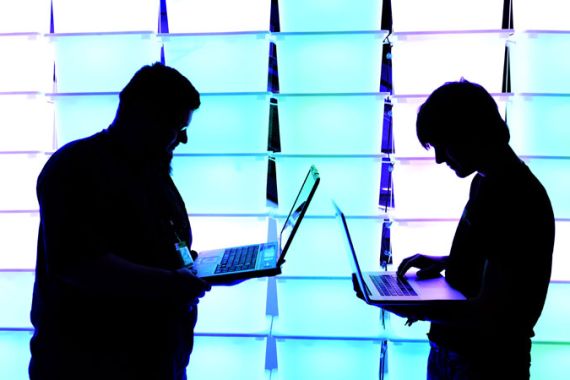German hackers’ drink of choice
Caffeine beverage has brought Germany’s hackers together, and now US counterparts are hoping for the same.

Berlin, Germany – It’s the beverage of choice for Germany’s hacker community thanks to its caffeine buzz that assists with prolonged subversive work online, and now the drink is helping bring together hacktivists around the globe.
Club Mate – a fixture among German hackers whose natural caffeine provides a quick energy boost – is catching on across the Atlantic. Germany’s status as the homeland of European hacking has been oiled by Club Mate, which has gained cult status among hacker groups since the 1990s.
|
|
| Listening Post – News media: The new frontline |
Hacktivists in the United States now see the drink as a way of emulating the success of Germany’s influential hacker association – the Chaos Computer Club (CCC) – which brings together members across the country. Where the CCC shows up, so too does Club Mate.
“The CCC in Germany has established its position on data security and is also taken seriously by politicians,” said Jens Ohlig, a former CCC board member and co-author of a book on hackers.
US-based hackers have had difficulty establishing a similarly strong hacker association, but some there are now studying the link between the beverage and hacker solidarity. A tour of Germany confirmed the key role Club Mate has played in bringing hacktivists together here.
“They thought maybe one issue was having these hacker spaces – physical spaces where people could meet, not just on the internet,” Ohlig said of the beverage’s potential influence on US-based hackers.
Germany is a stronghold of hacker culture that regularly hosts conferences, summer camps and workshops on information privacy where public consciousness of data security and freedom is high. The high profile status obtained by international hackers was recently confirmed when WikiLeaks stepped in to help US whistleblower Edward Snowden and provide him with legal advice.
Snowden’s revelations about Washington’s PRISM programme, for example, caused dismay in the country and prominent German politicians criticised the surveillance of internet users outside the US.
Family business
Fans of the drink – now widely sold in German cities and distributed in 39 other countries – point to the role played by the Loscher family of Bavaria in popularising it.
After buying the Club Mate trademark in 1994, the father of executive director, Markus Loscher, drove around Germany in his truck delivering it to early customers including the CCC – earning him the nickname “Papa Loscher” among hackers.
Ohlig said Club Mate’s popularity in Berlin has its roots in the 1990s among the city’s radical squatter groups, eventually spreading to techno clubs and hacker spaces as well.
|
|
| Inside Story Americas – Public safety or privacy intrusion? |
The Loscher Brauerei – one of the medium-sized “Mittelstand” companies considered the backbone of Germany’s economy – has kept a low profile and cleverly cultivated the drink’s “alternative” fan base.
Loscher speaks proudly about the brewery’s decision not to pay for advertising or sponsorship, insisting instead that Club Mate has spread by word of mouth.
“We’ve never wanted to have an image or seem artificial. I think we come across to consumers as pretty honest,” Loscher said.
At the most recent Chaos Computer Congress – a huge event every December – organisers said more than 23,000 bottles of mate drinks were sold to more than 6,000 attendees.
US debut
Unlike other energy drinks, Clube Mate is low on sugar and the prime ingredient that gives it a kick is yerba maté, a South American jungle plant that is high in caffeine.There are about 100 milligrams of caffeine in each 500 millilitre bottle.
Other than fighting off fatigue, the natural stimulant is also said to reduce muscle tension, a perfect mix for hackers spending long, stationary periods in front of a computer screen.
The drink made its US debut at the 2008 HOPE (Hackers On Planet Earth) conference in New York organised by the internet security magazine 2600, which has become its distributor in the country.
Kyle Drosdick, a magazine photographer, said 2600 publisher Emmanuel Goldstein had tried Club Mate while visiting CCC members in Germany.
Many US hackers attending the HOPE conferences had heard of or tried Club Mate, making the event a successful platform for popularising the drink. At the last conference in 2012, about 5,000 bottles were sold.
Despite the beverage bringing Germany’s hackers together, that so far hasn’t been the case in the United States. Drosdick said, unlike in Germany, distribution of Club Mate to US hacker venues has been hampered by a lack of cohesion among myriad groups.
“German hacker spaces are very connected. As a CCC member, you can go to your local hacker space and be connected to every other space in Germany without really even trying,” he explained.
“The cohesion in America – I don’t know if it’s how we’re spread out geographically – is not something we’ve just infiltrated.”
Drosdick and colleagues from 2600 have visited the Loscher family’s brewery in the small town of Münchsteinach in an effort to help turn the tide back home.
“We have a really good, long-standing relationship with the Loschers,” Drosdick said. “And this connection with CCC and other huge consumers of Club Mate – we think we should stick together.”
While Club Mate has entered the mainstream in Germany, it is still providing a link between hackers abroad that harks back to its radical roots.
Asked about his relationship with the CCC, Loscher responded softly, “It’s really cute. They actually made marmalade and sent it to us as a gift. They made marmalade with Club Mate and called it ‘Matelade.'”